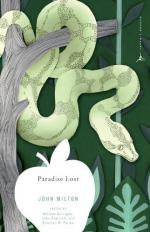|
This section contains 10,166 words (approx. 34 pages at 300 words per page) |

|
SOURCE: “The Politics of Poetry: Feminism and Paradise Lost,” in Milton Studies, Vol. XIV, 1980, pp. 3-24.
In the following essay, Webber claims that Milton, however awkwardly and imperfectly, breaks new ground when he raises issues concerning women's rights and importance.
In the highly delicate investigation of the relationship between politics and poetry, epic makes an obvious, though exhausting, field of inquiry. Traditionally, epic is described as a mingling of history with myth. Whatever this formula may actually mean, its effect is always that we are pulled in two ways, between a concern for the facts of the story (where was Troy? and when?) and a response to the universality of its symbols (Troy is any dying civilization). In epic we cannot have the one without the other: if Troy does not mean something, it does not matter where it was; if we do not know its actual history...
|
This section contains 10,166 words (approx. 34 pages at 300 words per page) |

|


